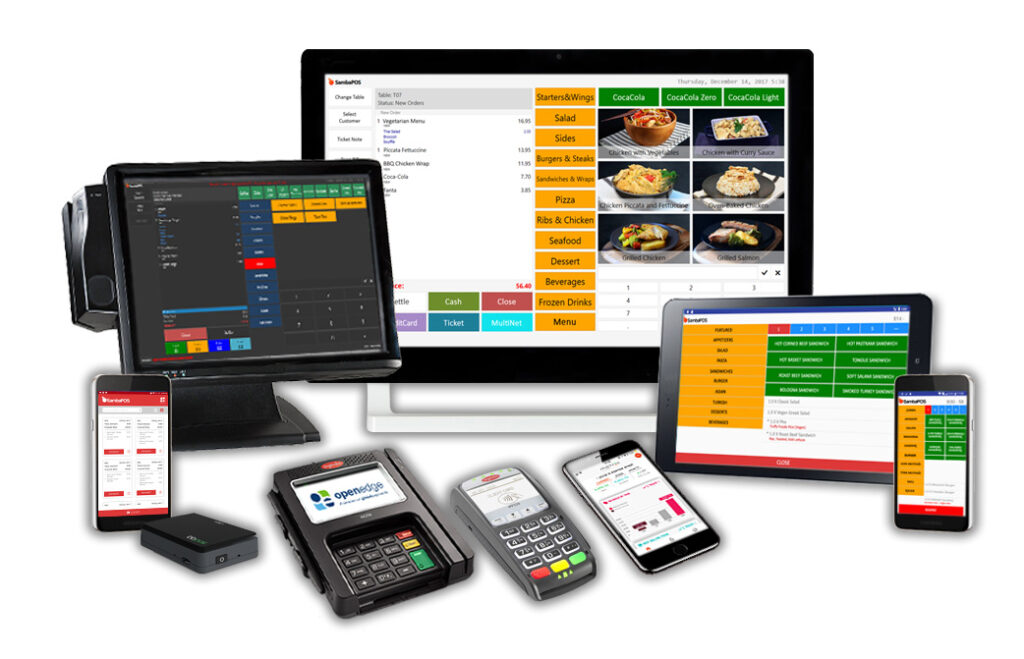What every retailer needs, first and foremost, is an effective POS (Point Of Sale) system. It is the core of the business and has numerous functions such as inventory management, sales, and employees report, customer management, and many more.
But keep in mind that there is more than one type of POS and they all serve different purposes. Therefore, it is essential to choose the right POS for your business. This article acts as your guide to 4 main types of POS systems that are accessible nowadays.
Overview
Desktop POS system

This kind of system operates on a computer/laptop, either on an app, a browser, or an on-premises system. It is connected to a cash drawer, a barcode scanner, a card swiper, so it performs just like a normal cash register.
Desktop POS is perfect for businesses that are high volumes such as restaurants, grocery stores, fashion stores, book stores, salons, and spas.
Mobile POS system
A mobile POS, in contrast to a desktop POS, is much smaller in size but just as helpful. It mainly consists of a phone app that attaches to a card reader. That being so, all you have to do is turn on the POS software and start selling. Other accessories like barcode scanners and receipt printers are optional.
Since a mobile POS does not take much space, it has the advantage of being portable and allows you to ring up sales right on the spot. It is highly popular with small-scale businesses, for instance, street vendors, fair/event vendors, freelance workers.
Tablet POS systems
A tablet POS works just about the same as a mobile POS, both are installed on the devices with any optional attachments (card swiper/receipt printer). The only difference is that tablets are usually much bigger, their screens are larger so that images are displayed more sharply with more vivid colours. These types of POS should come in handy for businesses with larger inventory. It makes ordering and purchasing tasks easier for both your staff and customers.
►►►► Please visit our products: digital banking, situation analysis, Shopify markets, Vietnam Photography Tour, Photography Tour Guide Viet Nam, supply chain operations management, fintech ai, Multi Store POS, Woocommerce POS, Mobile POS, White label POS, POS Reseller, Beauty Supply Store POS, Retail POS and Vape shop POS
Suggested places for tablet POS are small businesses with more controlled resources: coffee shops, gift shops, art galleries, etc.
Self-service kiosk POS systems
Types of self-service POS allow customers to make purchases by themselves without having the need for any employee. The main purpose of this system is to make operations more efficient while saving on manpower for businesses. A self-service kiosk POS setup is usually similar to a desktop POS, but with additional security functions, in this way all transactions are one-ended and risks are prevented.
One of the most popular technologies used for self-service POS systems is the advanced Progressive Web App (PWA). PWA is a website-turn-app that requires little to nothing space on your devices, doesn’t need downloading, and is very low-cost. At ConnectPOS, we have been using PWA technology to build ConnectPOS PWA Consumer App, Leading Magento 2 POS for Omnichannel Retail.
Self-service POS is typically used for ticket sales, parking, patient check-in, etc. For example, self-service POS offered in movie theatres could help customers to schedule and purchase tickets on one’s own. Another example would be grocery stores, where customers are able to check the price of a product and checkout on their own.
Conclusion
In the end, a smart thing to do when it comes to retail businesses to succeed is choosing the appropriate POS system. Do consider what type of POS system is the right fit for your business with the help of the guide above.
If you are searching for a system that could run on multiple devices (mobile, tablet…), you could take a look at ConnectPOS, a POS system that offers cutting-edge technology and 24/7 support.
